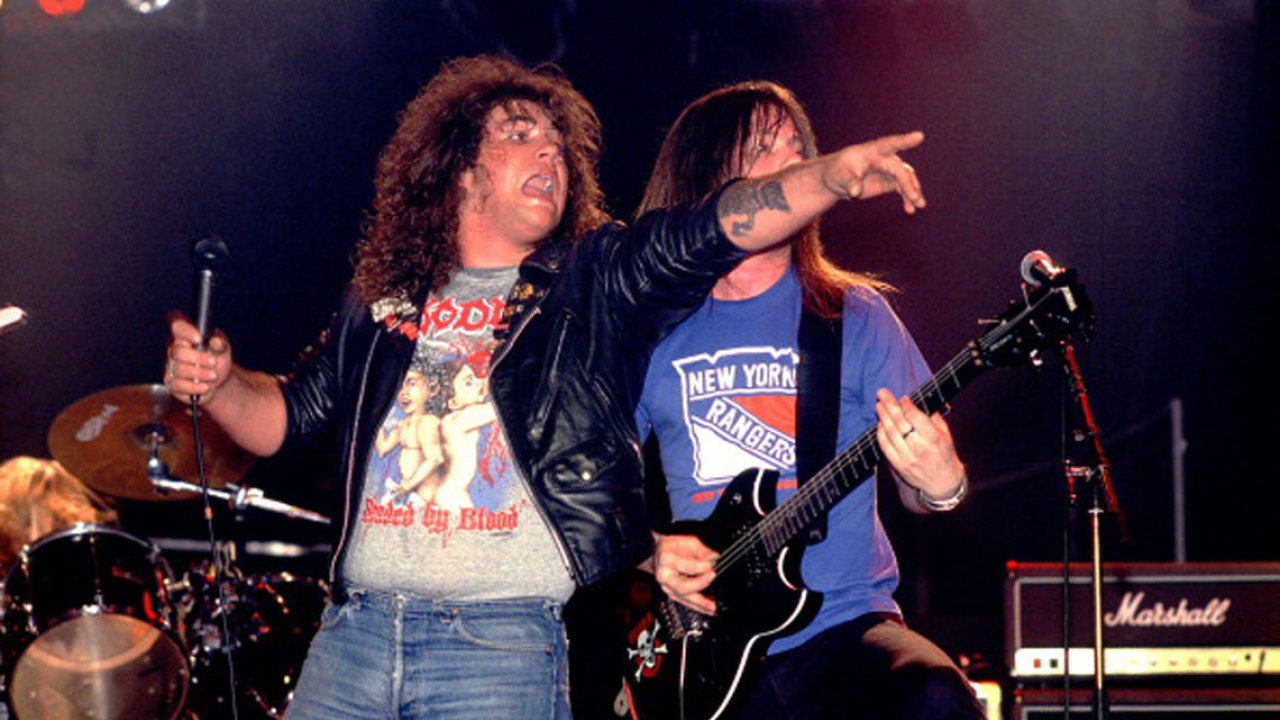In the early 1980s, San Francisco was a hive of underground activity, its network of clubs nourishing a stream of ever more extreme heavy metal bands. The early Bay Area scene was so enticing that the fledgling Metallica relocated there from Los Angeles. And it wasn’t long before one of the leading progenitors, Exodus, found that their guitarist Kirk Hammett had been spirited away to join the new kids in town.
“We gave Kirk a good send-off by going to his first show with Metallica at the Old Waldorf, cutting up hundreds of our old promo photos and sticking his face everywhere – from the bar to the ladies’ bathroom,” Exodus guitarist Gary Holt reminisces fondly. “We haven’t spoken in a while, but it proved to be a good move for Kirk – and for his bank account.”
With Hammett’s replacement Rick Hunolt in place, Exodus scored rave reviews for their watershed debut album, 1985’s Bonded By Blood. To the untrained ear, thrash metal’s combination of pneumatic drumming and searing lead guitar was nothing but an undisciplined mess. But that didn’t stop it from spreading like the plague.
“Were we aware of the importance of what we were doing back then?” Holt muses. “I didn’t have the faintest idea of where it would lead, but I knew we enjoyed it and so did the fans, and that was all that mattered.”
Singer Paul Baloff was acrimoniously fired before the second album, 1987’s Pleasures Of The Flesh, which featured ex-Legacy frontman Steve ‘Zetro’ Souza. With hindsight, Holt regrets the way Baloff was ousted, “because although he was completely fucked up by drugs the rest of us weren’t far behind”.
Nevertheless, Exodus found themselves handily placed among an elite breakaway pack – the so-called Big Four, completed by Metallica, Anthrax and Megadeth – but their failure to secure a major label deal meant they were rapidly losing ground to the others, and also to Slayer, who replaced them in the Big Four pack. And when Exodus ended a string of independent releases with their fourth album, 1990’s Impact Is Imminent, they soon realised they’d signed to the wrong label.
“Capitol Records,” Holt relates miserably. “They’d tried for years to buy our contract from Combat Records, but by the time they did eventually sign us everybody we knew there had left the company. We were stranded on an island where nobody gave a fuck about us.”
There was one more album for Capitol, the very below-par Force Of Habit in 92, but when Holt became a father the following year it was time to stop.
“We were in a lose- lose situation,” he said. “Grunge was on its way and metal was dead in the water.” Five years would pass before Exodus and a returning Paul Baloff reunited briefly, documented by a second live album, Another Lesson In Violence [the first was 1991’s Good Friendly Violent Fun, released on Combat].
In September 2001 they gave it another go. Audience reactions were phenomenal, and the old magic seemed to have returned, but many of the original problems were still bubbling away beneath the surface. Even after Baloff succumbed to an excess-provoked stroke the following February the message still didn’t get through.
“You’d think something like that would wake us all up. Instead I dove further in,” Holt admits. “When you’re busy smoking crank, all you’re concerned with is smoking more crank. In fact, since I quit doing speed, the songs have become a lot faster.”
Steve Souza rejoined for a European tour, during which it was difficult to obtain drugs. It proved to be the turning point. Returning home dope-free three weeks later, Holt managed to clean himself up, and then persuaded Hunolt and drummer Tom Hunting to follow suit, ultimately influencing Souza’s decision to stay on.
“Steve had laid everything on the line – it was the drugs or him,” he confides. “I don’t miss the dope now, more the camaraderie of sharing the pipe. But if we hadn’t called a halt we couldn’t have made our new album. In fact I probably wouldn’t even be talking to you now.”
The new album that Holt refers to is 2004’s Tempo Of The Damned, the first studio release from Exodus in 12 years. It’s also arguably the best since their debut. The band’s rebirth couldn’t have been any better timed, with Metallica turning in the disappointing St Anger, and Robb Flynn going on record as saying there would be no Machine Head had Exodus not existed.
“We’ve definitely released some inferior product, but now the only way for Exodus is up. I’m still living a giant adolescent fantasy, and I refuse to grow up,” Holt concludes happily. “I am a Toys R Us kid.”

Exodus: A Bluffer's Guide
Musical style in a nutshell: Bone-shattering thrash metal with scorching twin-guitar solos.
Classic Rock recommends: Bonded By Blood [1985], Tempo Of The Damned [2004].
If you meet the band, do say: “Fancy signing to Capitol Records again?”
Don’t say: “C’mon, get the crank out.”
Not to be confused with: A load of Israelites leaving Egypt, Bob Marley & The Wailers’ Exodus album.
This guide to Exodus originally appeared in Classic Rock issue 65.

